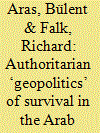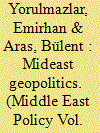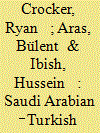|
|
|
Sort Order |
|
|
|
Items / Page
|
|
|
|
|
|
|
| Srl | Item |
| 1 |
ID:
137736


|
|
|
|
|
| Summary/Abstract |
The Arab Spring has shaken not only the state and society dimension in the countries of the MENA region but also the power of authoritarian leaders that had been ensured for a long period of time. This paper takes a critical look at the issue of how authoritarian regimes reacted to the new political atmosphere produced by the Arab Spring. More specifically it attempts to identify how geopolitical reasoning influenced the formulation of new strategies designed to promote the survival of authoritarian regimes. It focuses upon the geopolitical reasoning relied upon by Iran and Saudi Arabia, which included creating threat-enemy chains in domestic politics, shifting alliances in regional policy and taking advantage of relations with external actors to gain support for authoritarian rule at home
|
|
|
|
|
|
|
|
|
|
|
|
|
|
|
|
| 2 |
ID:
084017


|
|
|
|
|
| Publication |
2008.
|
| Summary/Abstract |
In recent years, there has been a notable softening in Turkey's foreign policy toward Syria and Iran. How might we explain the change in Turkey's attitude toward these two countries considering the hostile relations of the 1990s and the worsening security situation in the Middle East? Drawing upon securitization theory, this article argues that domestic problems have influenced Turkey's foreign policy toward Iran and Syria in the past, as foreign policymakers have successfully externalized the sources of political Islam and Kurdish separatism. The remarkable softening of Turkey's foreign policy toward Syria and Iran since the beginning of the present decade can best be explained by looking at changes at the domestic level, particularly in terms of the process of desecuritization currently taking place within Turkey. Among other things, this process of desecuritization is the result of the European Union accession process and concomitant steps toward democratization, a transformation of the political landscape, and the appropriation of EU norms and principles in regional politics. Within this process of desecuritization and democratization, formerly securitized and dramatized issues have begun to be perceived as normal political issues. As a result, the policymaking process is now emancipated from ideational barriers, while there has been a substantial increase in the flexibility of foreign policy attitudes and the ability of foreign policymakers to maneuver in regional policy.
|
|
|
|
|
|
|
|
|
|
|
|
|
|
|
|
| 3 |
ID:
154311


|
|
|
| 4 |
ID:
163890


|
|
|
|
|
| Summary/Abstract |
The following is a transcript of the ninety‐fourth in a series of Capitol Hill conferences convened by the Middle East Policy Council. The meeting was held at the Capitol Visitor Center in Washington, DC, on November 30, 2018, with Richard J. Schmierer, chairman of the Council's board of directors, moderating, and Thomas R. Matthair, the Council's executive director, serving as discussant.
|
|
|
|
|
|
|
|
|
|
|
|
|
|
|
|
| 5 |
ID:
149443


|
|
|
|
|
| Summary/Abstract |
State failure, sovereignty disputes, non-state territorial structures, and revolutionary and counter-revolutionary currents, among others, are intertwined within the Arab Spring process, compelling old and emerging regional actors to operate in the absence of a regional order. The emergent geopolitical picture introduces the poisonous mix of loss of state authority spiralling toward instability, defined by sectarianism, extremism, global rivalries, and ultimately irredentism within interdependent subregional formations. This assertion is substantiated by detailed and specific evidence from the shifting and multi-layered alliance formation practices of intra- and inter-state relations, and non-state and state actors. Analysis of the relations and alliances through a dichotomous flow from domestic to regional and regional to global also sheds light on prospective future order. A possible future order may take shape around a new imagination of the MENA, with porous delimitations in the form of emerging subregions.
|
|
|
|
|
|
|
|
|
|
|
|
|
|
|
|
|
|
|
|
|